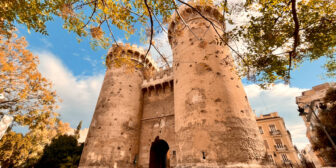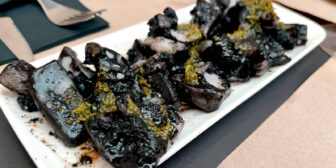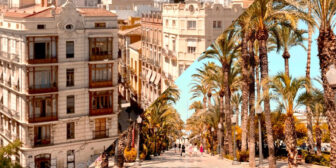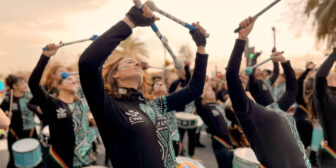Valencia has deep-rooted traditions and a tight-knit community spirit. This is never more obvious than during the many festivals celebrated in Valencia throughout the year.
From colorful parades and solemn processions to earth-shattering firework displays and quirky flower battles, Valencian festivals are an experience like no other.
I’m a serial festival goer and have attended many festivals in and around Valencia, some more than once. Out of all, these are my favorite.
Whether they are held in honor of saints or centuries-old traditions, these festivities are a great opportunity to experience the local culture in its purest form.
I strongly encourage you to book your next trip to Valencia around one of these unique celebrations and see for yourself just how amazing the festivals in Valencia are.
In This Article
Best festivals in Valencia – major festivals you cannot miss
These five unique festivals are worth planning a trip around as each of them is an incredible opportunity to immerse yourself in Valencia’s rich culture and traditions.
1. Las Fallas de Valencia Festival
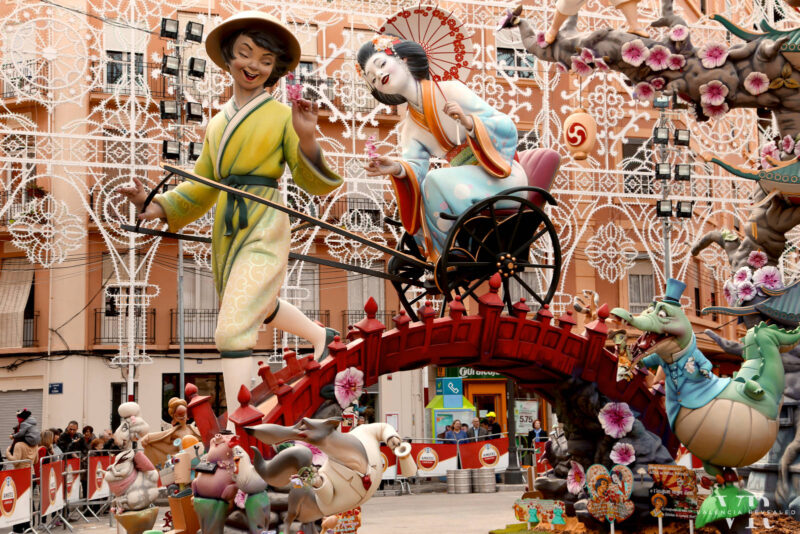
When: March 15th to 19th (some events start as early as March 1st)
Las Fallas is the wildest and craziest festival celebrated in Valencia. It’s a UNESCO Intangible Cultural Heritage of Humanity and the largest street party in Europe.
Every March, Valencia becomes an open-air museum with over 700 gorgeous wood and polystyrene art pieces displayed on its streets. But this is not even the most mind-boggling part.
On the last night of the festival, all but two of these artworks are set ablaze in towering bonfires, reaching up to 20 meters (65 feet) in height.
Las Fallas crowns the list of fun things to do in Valencia. There are daily firecracker shows, music concerts, paella cooking contests, and fire parades all on a religious backdrop that includes flower offerings to the Virgin Mary and thousands of locals in elaborate silk clothes.
Truth be told, words could never do this festival justice. You simply have to live it to believe it.
To learn more about this festival, read these interesting Las Fallas facts. I also put together a list of the most delicious foods to eat at Las Fallas.
2. Semana Santa Marinera (Maritime Holy Week Festival)
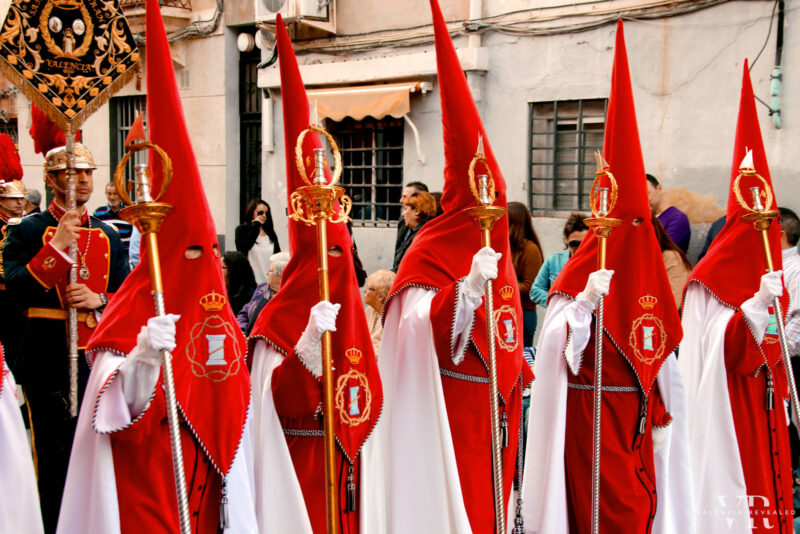
When: During the week leading up to Easter Sunday (March 28th to 31st, 2024)
Easter in Valencia is no egg hunt. And there are no giant bunnies, chocolate figurines, or fun gifts either. Instead, Easter in Valencia is all about the religious side of the festival.
The Maritime Holy Week (Semana Santa Marinera) takes place during the week leading up to Easter Sunday in the neighborhood of El Cabanyal, a former fishing village.
There are daily religious processions; people in colorful period costumes; elaborate floats featuring statues of biblical figures; brass bands and drummers playing mournful music, and evening masses.
The most unusual sight, however, is the religious brotherhoods – men and women dressed in colorful silky costumes with pointy cone-shaped hoods called capirote.
These hoods are historical costumes and a symbol of penance. They date as far back as the Spanish Inquisition when they were used as a form of punishment.
If you’d like to learn more about the Semana Santa events and traditions, read my article on Easter in Valencia.
3. Gran Feria de Valencia (Great Valencia Fair)
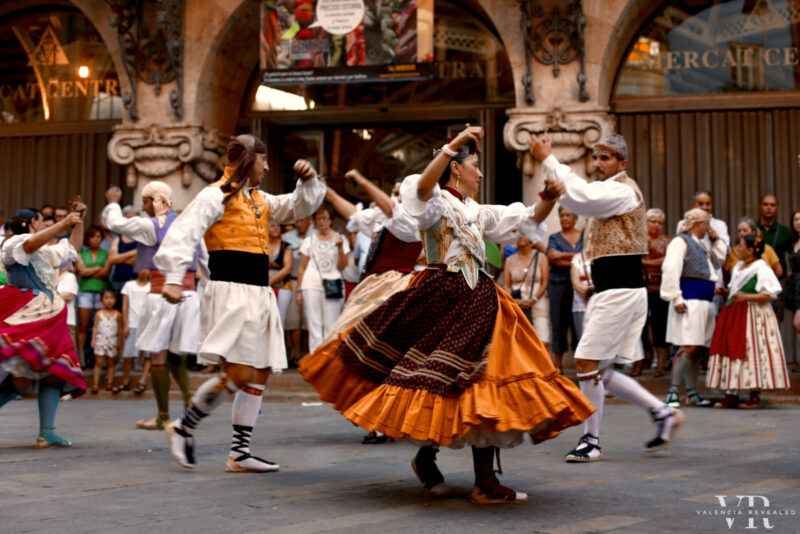
When: July 1st to the last Sunday of July (July 1st to 28th, 2024)
The Great Valencia Fair brings a full month of celebrations in the form of outdoor concerts, firework displays, medieval markets, paella tastings, and more.
The festival was held for the first time some 150 years ago and offers an extensive list of fun activities and cultural events, most of which are free.
Think pop, rock, jazz, and classical music concerts. Alfresco theater plays. A night when the museums are open until midnight. Flamenco shows. Jota performances (a local traditional dance accompanied by castanets). And zarzuela style-operas.
The grand finale takes place on the last Sunday of July with an elaborate parade of colorful floats and an epic flower battle.
Also read: Valencia in July: Weather, What to Do & What to Wear
4. Day of the Valencian Community
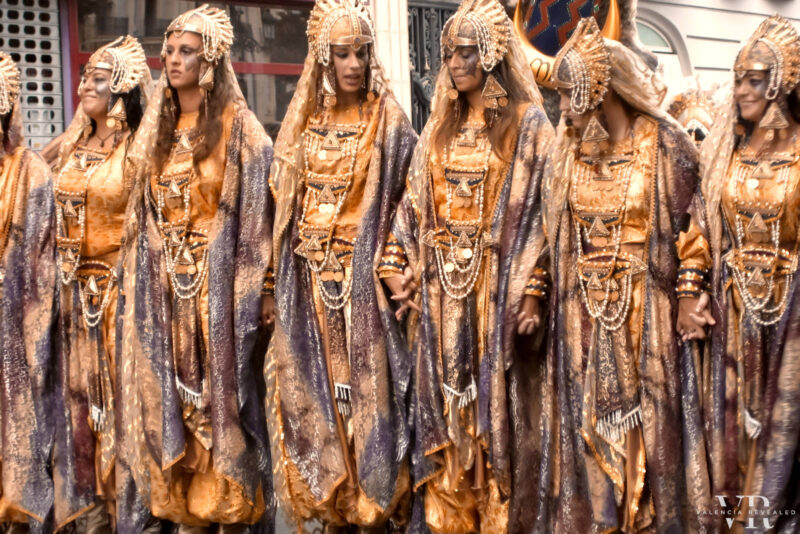
When: October 9th
Crack any Spanish history book and you’ll learn pretty quickly that Moors had a foothold in the Iberian Peninsula for nearly 800 years. This led to the Spanish Reconquista, a tug-of-war between Moors and Christians that ended with the victory of the latter.
Today, the clash between the two cultures comes to life once more at Moros y Cristianos festivals organized throughout Spain at different times of the year.
In Valencia, this festival is celebrated on October 9th – the Day of the Valencian Community, the Spanish region that includes the provinces of Valencia, Castellón, and Alicante.
October 9th is a very special day in Valencia, as it commemorates the triumphant entry of King James I of Aragon into the city after defeating the Moors in the year 1238.
Colorful Moros y Cristianos parades, firework displays, a fun medieval market, and other more formal events are held on this day.
October 9th is also the Lovers’ Day in Valencia – Día de San Dionís, similar to Valentine’s Day. For this occasion, pastry shops throughout the city craft delicious fruit and vegetable shaped marzipan sweets, adding to the festive atmosphere.
Also read: Valencia in October: Weather, What to Do & What to Wear
5. Cavalcade of the Magi
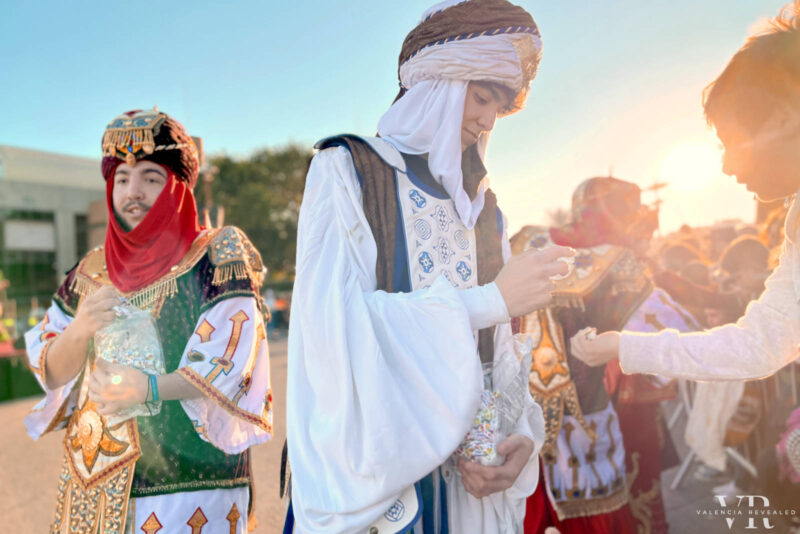
When: January 5th
The Cavalcade of the Magi is a truly magical parade that takes place on Epiphany Eve (January 5th), also known as the Twelfth Night of Christmas.
If you are spending Christmas in Valencia, you absolutely shouldn’t miss this parade.
January 5th is without a doubt the most anticipated day of the year for the Valencian children. The gift-bearing Magi arrive by boat and then parade the streets of Valencia in colorful floats.
There are also dancers and music bands and the pages throw candy and toys into the crowd along the route.
After the parade, kids are supposed to go to bed early. But not before leaving some cookies and milk (or something stronger) for the Magi and some water for their camels.
During the night, the Three Wise Men will arrive bearing the gifts requested by the children in their letters. Traditionally, the naughty ones are supposed to receive coal-shaped candy instead. As you can imagine, this isn’t very common these days, although the candy is a treat in itself.
Best festivals near Valencia
Aside from the festivals celebrated in Valencia, there are numerous other noteworthy festivals held in the nearby towns and villages. These celebrations make for wonderful day trips from Valencia while offering a unique opportunity to explore the surrounding region.
6. Moros y Cristianos Festival, Alcoy
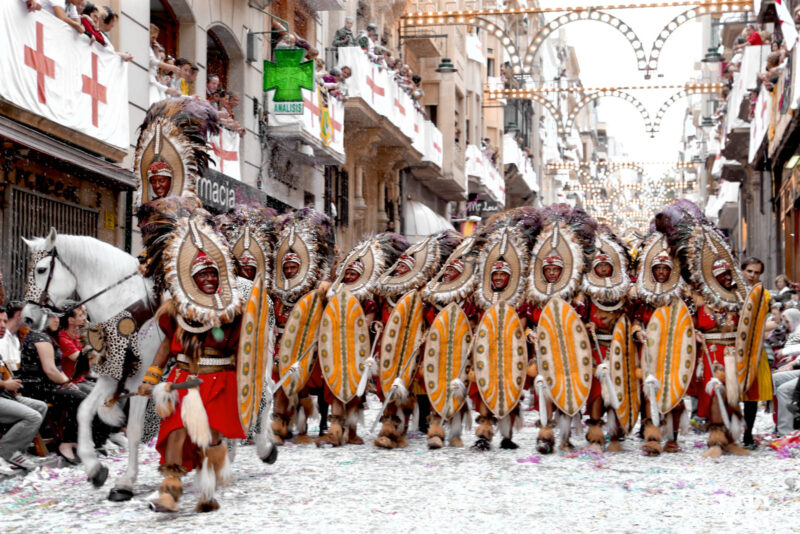
Where: Alcoy (110 km south of Valencia)
When: Around April 23rd, St George’s Day (April 20th to 22nd, 2024)
How to get there: Car or regional train from Estación del Norte
The Moros y Cristianos festival in Alcoy is quite possibly the world’s oldest and most dazzling celebration of its kind.
It takes place annually around St. George’s Day (April 23rd) as legend has it, he assisted the Christian troops in their victory over the Moors in the Battle of Alcoy in 1276.
Dating back to the 16th century, this festival spans three days and features breathtaking parades, medieval battle reenactments, and even an appearance by the saint in the form of a child.
Moros y Cristianos festivals are organized throughout Spain, but the ones in Valencia and Alicante are some of the best.
7. Hogueras de San Juan Festival, Alicante
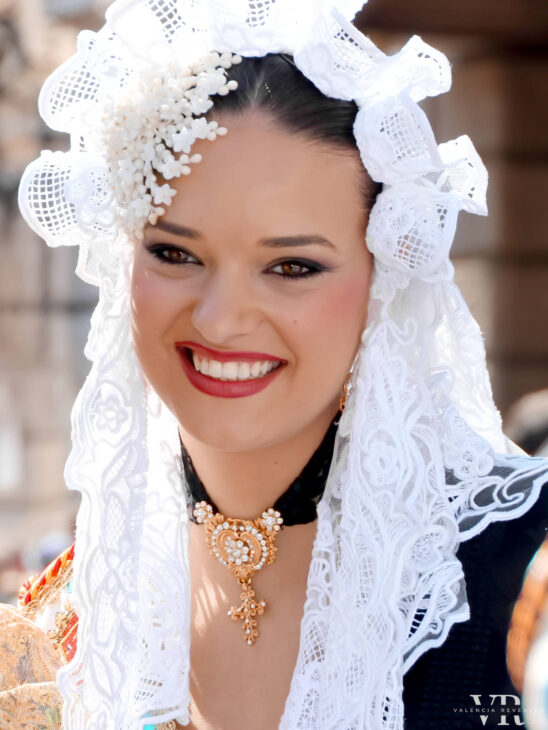
Where: Alicante (170 km south of Valencia)
When: June 20th to the 24th
How to get there: Car or media distancia train from Estación del Norte
Hogueras de San Juan is a lively festival marking the arrival of summer. It was first celebrated in 1928 when it emerged as a copy of Las Fallas of Valencia. As such, it has all the key elements of Las Fallas – colorful polystyrene figures, mascletás, and bonfires – but on a smaller scale.
In time, the festival took on a character of its own as the warm June weather allowed for more beach activities.
Not to be missed are the spectacular firework displays over Santa Barbara Castle visible from the beach and the various good luck rituals like the midnight wave-jumping.
Also read: Valencia or Alicante: Which City Should You Visit Next?
8. Alfàbegues Festival, Bétera
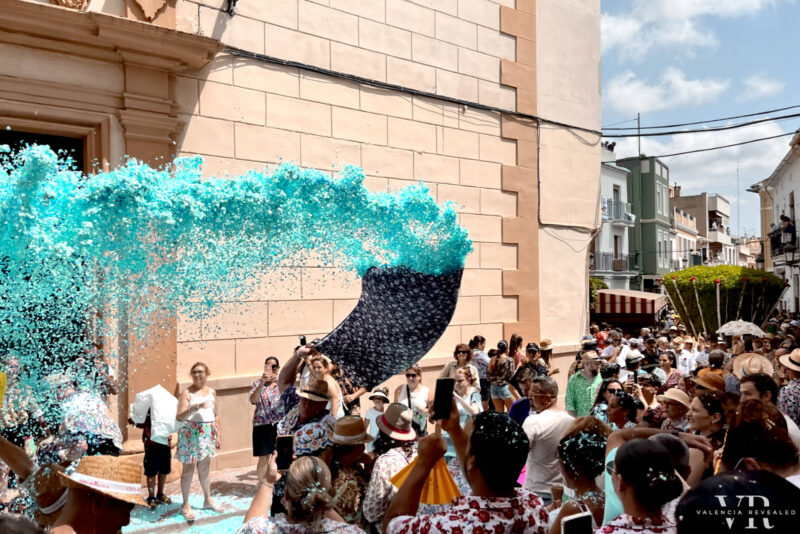
Where: Bétera (20 km northwest of Valencia)
When: August 15th
How to get there: Car or metro line 1
Fiestas de Les Alfàbegues is the world’s largest basil offering to the Virgin Mary.
With roots stretching back centuries, this Valencian festival has experienced a recent surge in popularity. No wonder, given that it’s one of the most fun and unusual celebrations in Valencia and the surrounding region.
On August 15th, around two dozen colossal potted basil plants, two to three meters in height, are paraded through the streets. Tones of confetti are thrown into the air and the spirited party lasts all morning.
As evening approaches, a religious procession unfolds, followed by breathtaking pyrotechnic displays, unlike anything you’ve seen before.
9. La Tomatina Festival, Buñol
Where: Buñol (40 km west of Valencia)
When: Last Wednesday of August (August 28th, 2024)
How to get there: Car or cercanias train line C3 from Estación del Norte
La Tomatina is the world’s largest and most famous tomato fight. Its origins can be traced back to 1945 when a group of friends started an impromptu tomato battle.
Despite initial efforts by local authorities to prevent it from becoming a tradition, La Tomatina was eventually instated as a local festival and soon gained international fame.
The messy yet friendly battle lasts about one hour and involves tons of over-ripe tomatoes.
These days, La Tomatina is a paid event and you must purchase your tickets in advance.
10. Modernista Fair, Benicàssim
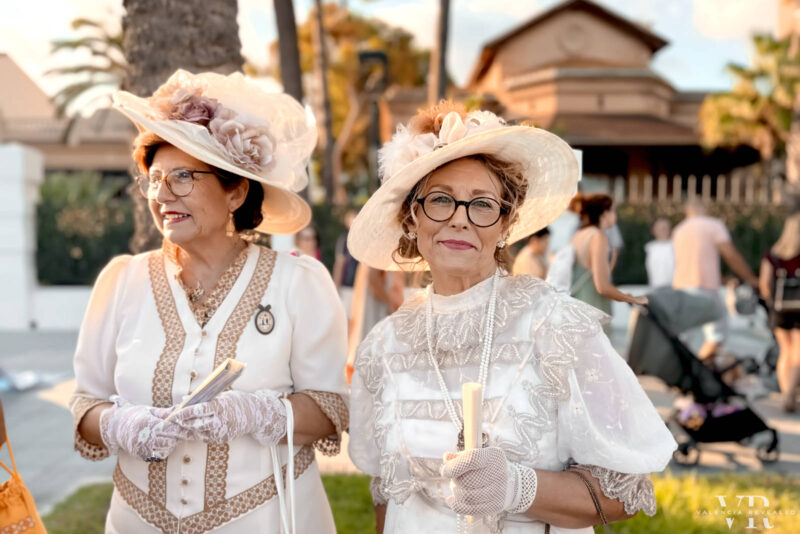
Where: Benicàssim (86 km north of Valencia)
When: First weekend of September
How to get there: Car or regional train from Estación del Norte
Benicàssim Belle Époque is one of Spain’s oldest Modernista festivals and the closest you’ll ever get to traveling back in time.
Different, magical, and fun, this festival is a nostalgic homage to the turn of the 20th century when the Modernista movement (known as Art Nouveau or Jugendstil in other countries) swept over Spain.
Set against the backdrop of Benicàssim’s stunning beachfront villas, this Valencian festival features an arts and crafts market, exhibitions, painting and fashion contests, concerts, and traveling shows that recreate the arrival of the bourgeoisie to the city.
11. Muixeranga Festival, Algemesí
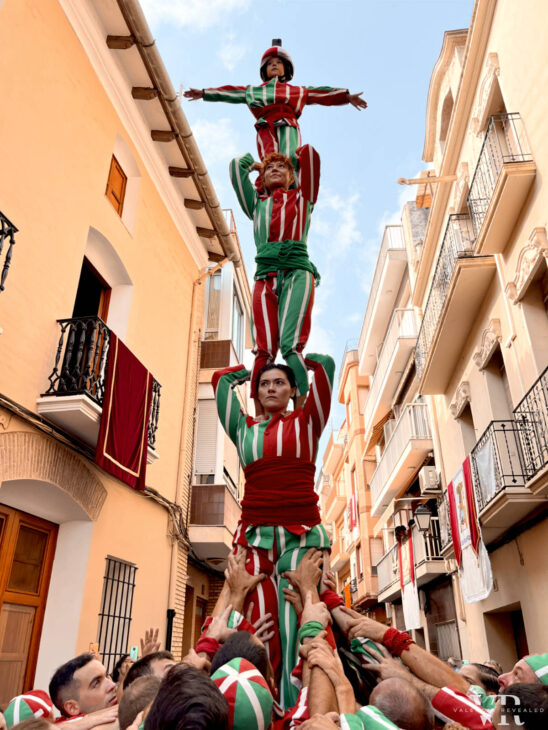
Where: Algemesí (36 km south of Valencia)
When: September 7th and 8th
How to get there: Car or cercanias train line C2 from Estación del Norte
The Muixeranga, known for its unique human tower-building performances, is another Valencian festival recognized as UNESCO Intangible Heritage.
Unlike Catalonia’s castellers, Muixeranga has a religious background and uses a different technique that results in more complex human towers with unique patterns.
The Muixeranga symbolizes cooperation and cultural identity and it’s accompanied by various super interesting traditional dances.
This festival includes three processions, two of which take place in the evening and last for up to eight hours. However, the morning one on September 8th is the most popular one.
Other Valencia festivals you might be interested in
Valencia hosts many other smaller festivals throughout the year. If your visit to Valencia aligns with any of these events, I highly recommend taking a break from sightseeing to partake in the festivities as they can be a lot of fun.
Chinese New Year
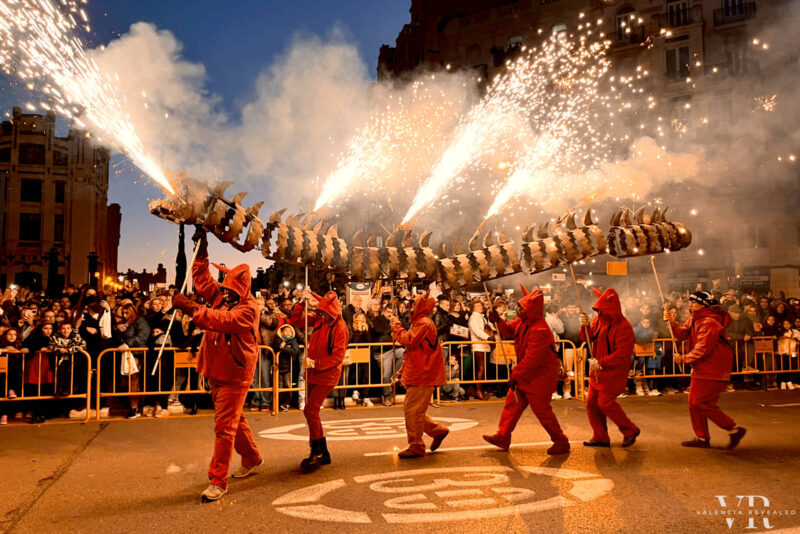
When: Varying dates – February 10th, 2024
In Valencia, the Chinese New Year is welcome with a day full of events, such as Chinese calligraphy and knot-making workshops, dances, and traditional songs in the City Hall Square.
In the evening, there’s an hour-long parade starting from Calle Pelayo and ending in City Hall Square. The parade features Chinese lions and dragons, floats, pyrotechnics, colorful costumes, traditional dances, and martial arts demonstrations.
They also throw candy into the public. To catch a good spot, arrive at least 30 minutes in advance.
Paella Festival – Paellas universitarias
When: Varying dates
Initially, this was an event of small proportions where university students in Valencia would get together to celebrate the arrival of spring with a good plate of paella and beer. These days, the Paella Festival is one of the biggest university events in Europe.
Expect food trucks, live music, karaoke contests, and lots of paella, beer, and sangria. In 2023, the Paella Festival was celebrated on April 21, 22, and 28 and, to a smaller extent, on January 27, at Marina Beach Club. Tickets must be purchased in advance.
Also read: Best Paella in Valencia: Top 6 Restaurants You Must Try
***
I hope these great Valencia festivals have captured your imagination and you are ready to experience them for yourself. Don’t forget that festivals in Valencia are always a busy time and it’s best to book your accommodation in advance.


